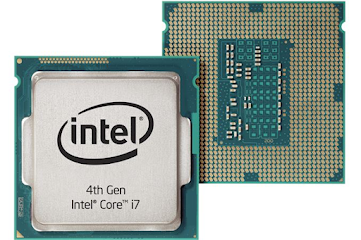Main components of a computer
It stands for central processing unit. The CPU is one of the most important parts of any computer, it acts like a brain. It processes and executes our commands and plays a big role in a device's speed and efficiency. When the CPU receives an instruction presented in binary form, the instruction is converted into signals that each part of the processor can work on. Finally, after the instruction is decoded, it is executed.
A core it´s a separate device inside the main CPU chip, meaning that it has the ability to do just one thing at a time. However, modern computers have the ability to support more than one core inside the main chip. The more cores a CPU has, the greater the computational power and the more tasks that can be running and completed simultaneously.
The clock speed of a processor is the number of instructions it can process in a second, measured in gigahertz (GHz). E.g: A CPU with a clock speed of 3.0 GHz can process 3 billion instructions each second.
RAM
It stands for random access memory. It´s a computer's short-term memory, where the data that the processor is currently using is stored (remembers).
No matter what type of computer you use, the minimum requirements are estimated for normal usage. However, if for example you are a serious gamer, you would need more RAMS.
RAM is usually sold in densities with multiples of 2 gigabytes: 2, 4, 8, 16, 32. E.g: if your computer has 8GB and you want 16GB total RAM, you would want to buy a module with an 8GB density.
HARD DRIVE
It is a non-volatile data storage device. Non-volatile refers to storage devices that maintain stored data when turned off.
The hard drive´s capacity storage is measured usually in gigabytes and terabytes. The size of the hard disk varies generally on the computer and laptop. It can hold around 100 GB of data.
- The spin speed (rotations per minute,or rpm) is relatively important. The faster the disk(plate) spins, the faster the computer can find the file it´s looking for. Spinning time of the disk in a normal computer varies from 5400 or 7200 RPM.
E.g: 500GB hard drives are common in many modern computers. The average four-minute song on iTunes is approximately 4MB in size. There are 1,000 megabytes in 1 gigabyte. This means that a computer with a 500GB hard drive could store 250,000 songs.
CACHE
A cache is a reserved storage location that collects temporary data to help websites, browsers, and apps load faster. The cache it´s faster than the RAM because it is often tied directly to the CPU
- Many applications and software also have their own cache. This type of cache temporarily stores app-related data, files or instructions for fast retrieval.
- The cache storage it´s measured in terebytes or kilobytes.
GRAPHIC CARD
The core of a graphics card is a chip called GPU (graphics processing unit). GPU is responsible for displaying images to your computer screen.
GPU receives instructions and data on displaying an image from the CPU. Then it processes the data and tells the computer screen what to display. And your computer screen receives the signals from the GPU and displays the image.
- There are two rivals brands that developed graphic cards: Nvidia and AMND.
- The GPU it´s measured in MHz, same as the clock speed(instructions it can process in a second) of the CPU.
- The FPS (frames per second) measure the number of times your graphics card redraws the screen every second.
Important terms:
- Hardware: It is any physical component of a computer system that contains a circuit board, or other electronics.
- Sofware: It is the set of instructions, data or programs used to operate computers and execute specific tasks. It is the opposite to hardware.
-1 byte(B): 8 bits
-1MHz= 1000000 Hz processing cycles of the graphic card in a second.
- 1GHz= processes 1 billion instructions every second.
- 1GB= 1000 MB






Comentarios
Publicar un comentario